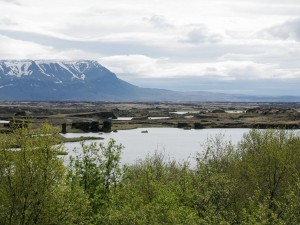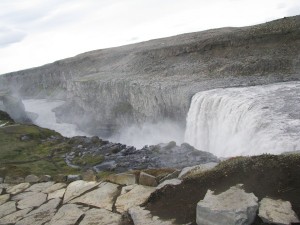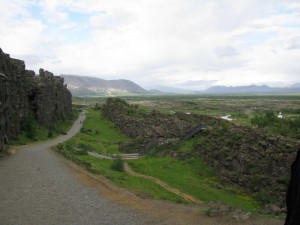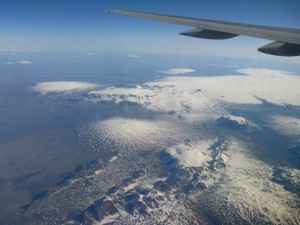Falling Fall and Mountain Moo. Posted by hulda on Jul 13, 2012 in Icelandic customs
 Despite that it’s föstudagurinn þrettándi (= the Friday 13th) I hope you’re all doing well!
Despite that it’s föstudagurinn þrettándi (= the Friday 13th) I hope you’re all doing well!
One of the quickest and the most effective ways of widening your vocabulary in any foreign language is to pick up a map and begin to translate the names of places. It’s not only easy – the repetition of certain words really helps you memorize them – but also fun, especially when it comes to names that make you wonder why on earth they were picked for that particular location.
You’ll learn in no time that fjall is a mountain, á is a river and that places called hraun (= lava) or sandur (= sand/volcanic sand) mean areas where there’s little else than those components anywhere around. Jökull is a glacier, dalur a valley, hver a hot spring, foss a waterfall, vatn a lake and fjörður a fjord. Bær can mean either a farm or a town, which is amusing when you’re driving around the country, thinking that you’re heading into a town which then turns out to mean five houses and a church (although my Icelandic contacts do tell me that that’s what a town is in Iceland… but sometimes I suspect that they’re just trying to pull my leg).
Other structures that maps can teach you include f.ex. braut (= path, way), vegur (= street, road) and staður (= a place).
Dettifoss, it does fall quite a lot.
Then the process gets interesting when these words are combined with another one, giving you a description of the place. Mývatn means Midge Lake and having once been there I’d say that’s exactly what it is. Þingvellir, which comes from the words þing + völlur, used to really be the fields where the ancient parliament gathered together. Dettifoss – well, detta as a verb means to fall and is very accurate a name for a waterfall that has the reputation of being the most powerful in all Europe. It’s also a safe guess that every island that’s called Flatey indeed is, as it is called, a flat island.
Þingvellir, the fields of the parliament.
Naturally some names are already so old that people can no longer say for certain what reason they were given for. Hekla is one such name, often confused with the verb hekla which mean crocheting. However, it’s more likely that her name means either a cape with a hood, or a comb. To know exactly which one it is, if either, we would need to see her the way she looked like back when she was named, but alas, we can only guess. Sprengisandur, a huge wasteland in above Vatnajökull (= Water Glacier) got its name by a different route. It used to be the only path that linked the people living in the north to the rest of the country, but alas it was not a safe one to cross. There was always the danger of útilegumenn (= outlaws), but what was more pressing was that there was nothing to feed the horses with in the barren waste. Therefore people had to travel past the area as fast as possible before they ran out of feed. The verb sprengja that nowadays means ‘to explode’ used to mean ‘to ride a horse until it nearly bursts of tiredness’.
But why on earth would a volcano be called Katla (= Kettle)? Or a mountain Baula (= Moo)?*
Langjökull: a long glacier is a Long Glacier.
*With Katla the usual suggestion is that its shape has given it the name. Another theory seems to be that, as one of the most active volcanoes in the history of Iceland, the amount of ash clouds it has produced might also have given the locals some inspiration. As for Baula, the verb baula indeed means to moo or to bellow but according to the dictionary it has once upon a time also meant kýr, a cow. Whether that makes the name any more sensible is open for discussion.

Build vocabulary, practice pronunciation, and more with Transparent Language Online. Available anytime, anywhere, on any device.
About the Author: hulda
Hi, I'm Hulda, originally Finnish but now living in the suburbs of Reykjavík. I'm here to help you in any way I can if you're considering learning Icelandic. Nice to meet you!






